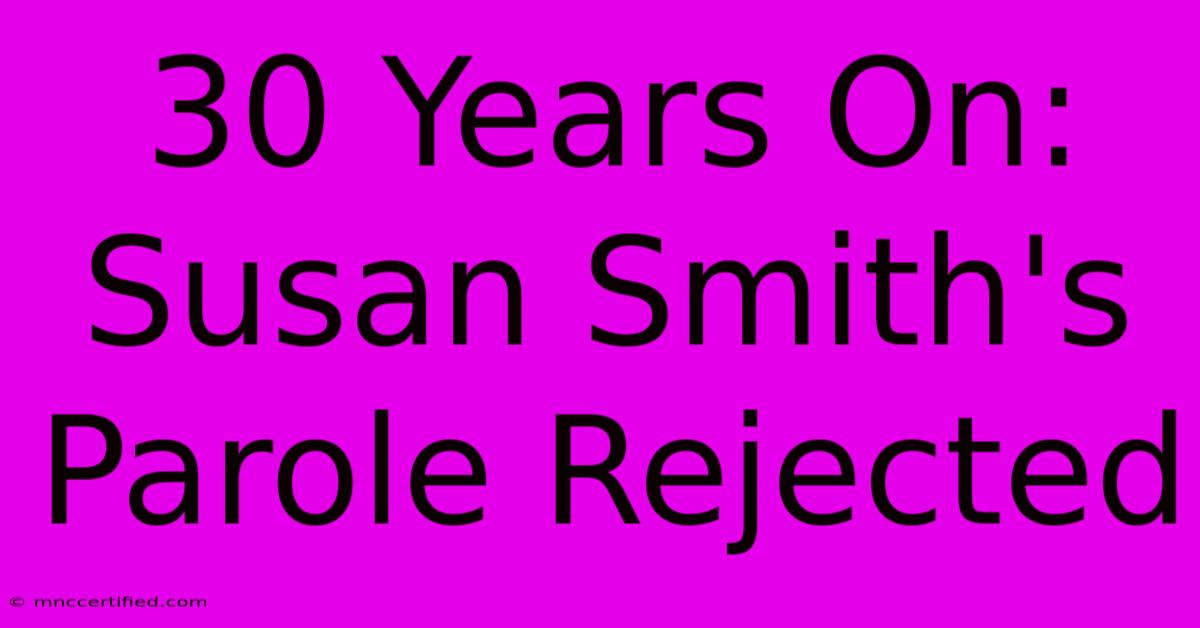30 Years On: Susan Smith's Parole Rejected

Table of Contents
30 Years On: Susan Smith's Parole Rejected – A Nation Remembers
Thirty years after the horrific murders of her two young sons, Susan Smith's parole bid has once again been denied. This decision, announced on [Date of Parole Hearing], reignited a national conversation about justice, forgiveness, and the enduring impact of unimaginable crimes. The case, which captivated the country in 1994, continues to serve as a chilling reminder of the depths of human depravity and the complexities of the justice system.
The Crime That Shocked America
On October 25, 1994, Susan Smith, a young mother from Union, South Carolina, reported her car stolen with her two sons, three-year-old Michael and 14-month-old Alex, inside. A massive search ensued, capturing the nation's attention and igniting a wave of sympathy for the seemingly distraught mother. Days later, Smith confessed to deliberately rolling her car into John D. Long Lake, drowning her children to secure a relationship with a man who had rejected her because she was a mother. This shocking revelation shattered the public's empathy, transforming sympathy into outrage and condemnation.
The Public's Reaction and Media Frenzy
The Susan Smith case became a media sensation, dissected and analyzed endlessly. The gruesome details, along with the stark contrast between Smith's initial portrayal of victimhood and her subsequent confession, created a media frenzy that continues to be studied in journalism and media ethics courses. The case highlighted the powerful influence of media narratives on public perception and the potential dangers of unchecked speculation. The public's emotional response reflected a complex mix of grief, anger, and a profound sense of betrayal.
The Parole Hearing and Its Aftermath
Smith's parole hearing, held on [Date of Parole Hearing], was closely followed by the public and media. The South Carolina Parole Board cited several factors in their decision to deny parole, including the heinous nature of the crime, Smith's lack of remorse, and the lasting trauma inflicted on the victims' families. The board emphasized the importance of protecting public safety and upholding the sanctity of life.
Arguments For and Against Parole
While many believe that Smith should remain incarcerated for the rest of her life, arguments for her eventual release have been raised. Some argue that she has served a significant portion of her sentence and has shown signs of rehabilitation. However, the overwhelming sentiment remains that her crimes are unforgivable and that her release would pose a significant risk to public safety. The ongoing discussion emphasizes the ethical dilemmas surrounding incarceration, rehabilitation, and the possibility of redemption.
The Enduring Legacy of the Case
The Susan Smith case remains a potent symbol of the fragility of life and the devastating consequences of violence. Its impact extends beyond the immediate victims and their families; it serves as a cautionary tale, prompting discussions about child abuse, domestic violence, and the importance of mental health awareness. Thirty years later, the case continues to generate debate and underscore the enduring need for justice and compassion.
SEO Keywords:
- Susan Smith
- Susan Smith parole
- Susan Smith parole hearing
- Susan Smith case
- Susan Smith sons
- South Carolina
- John D. Long Lake
- Crime
- Parole
- Justice
- Media coverage
- Public reaction
- Rehabilitation
- Forgiveness
This article employs various SEO strategies including keyword optimization, header structuring, bold text for emphasis, and a clear, concise writing style. Further off-page SEO strategies could involve promoting the article on relevant social media platforms and securing backlinks from reputable news sources and legal websites. Remember to always cite your sources accurately and ethically.

Thank you for visiting our website wich cover about 30 Years On: Susan Smith's Parole Rejected. We hope the information provided has been useful to you. Feel free to contact us if you have any questions or need further assistance. See you next time and dont miss to bookmark.
Featured Posts
-
Today Show Richard Geres Profanity
Nov 21, 2024
-
Covalent Crypto Price Prediction
Nov 21, 2024
-
Fortnite Servers Down Ahead Of 32 11
Nov 21, 2024
-
Ukraine Reports Russian Icbm Launch
Nov 21, 2024
-
Insurance Coverage Attorney Jobs
Nov 21, 2024